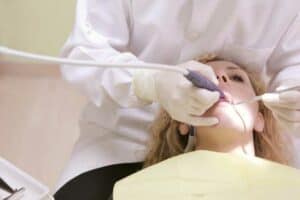
Not all Halloween candies are created equal when it comes to dental health. Some are more damaging than others. Hard candies, lollipops, and jawbreakers can pose a significant risk to your teeth as they stay in your mouth for an extended period, exposing your teeth to sugar and acids. Instead, opt for chocolates or treats that can be consumed quickly, minimizing the time your teeth are exposed to sugar.
If you have a choice, opt for dark chocolate over milk chocolate or sticky candies. Dark chocolate contains less sugar and is less likely to stick to your teeth. Plus, it has antioxidants that can benefit your overall health.
Sticky and gummy candies like taffy, caramel, and gummy bears can cling to your teeth, providing a feast for harmful bacteria. These candies are notorious for causing cavities. If you do indulge, be sure to brush and floss thoroughly afterward to reduce the risk of needing to get a filling from your dentist in Ann Arbor.
It’s tempting to dive headfirst into a mountain of Halloween candy, but exercising restraint is crucial for your dental health. Limit the number of treats you consume in one sitting and throughout the day. This helps reduce the amount of sugar your teeth are exposed to and gives your saliva time to neutralize acids and repair damage.
Water is your mouth’s best friend, especially during the Halloween season. Drinking water helps rinse away sugar and acids from your teeth, reducing the risk of cavities. Carry a reusable water bottle with you while trick-or-treating or at Halloween parties to stay hydrated and protect your teeth.
After indulging in Halloween treats, consider chewing sugar-free gum, preferably one containing xylitol. Chewing gum stimulates saliva production, which helps neutralize acids and clean your mouth. Xylitol can also inhibit the growth of harmful bacteria.
Halloween or not, maintaining a solid oral hygiene routine is essential for healthy teeth. Make sure you brush your teeth for at least two minutes, twice a day, using fluoride toothpaste. Don’t forget to floss to remove food particles between your teeth and along the gumline. Proper oral hygiene helps minimize the damage caused by sugar and prevents cavities.
Regular dental check-ups with your dentist in Ann Arbor are essential for maintaining good oral health. Schedule a dental appointment after Halloween to assess any potential damage and address any concerns. Your dentist can provide personalized advice on maintaining healthy teeth.
Enjoying Halloween treats without damaging your teeth is possible with some smart choices and good dental habits. Remember to choose your candies wisely, consume them in moderation, and prioritize oral hygiene. With these tips, you can have a happy and healthy Halloween season without any frightening dental surprises.
We’re always accepting new patients at our dental offices in Ann Arbor, Canton, Farmington Hills, and Livonia.

Why You Need a Dental First Aid Kit
Dental emergencies can strike at any time and often catch us off guard. From a sudden toothache to a chipped tooth, the pain and discomfort can be overwhelming. Having a dental first aid kit ready can prepare you for the unexpected, and the items inside can help in various ways.
Essential Items for Your Dental First Aid Kit
Now that you understand the importance of a dental first aid kit, let’s delve into what items you should include so you’re ready for anything.
Remember, a dental first aid kit is not a replacement for professional dental care. It’s a temporary solution to manage oral emergencies until you can see a dentist. Regular dental check-ups and good oral hygiene practices remain the best ways to prevent dental emergencies in the first place.
We’re always welcoming new patients at our dental offices in Ann Arbor, Canton, Farmington Hills, and Livonia. Call the office closest to you to schedule an appointment today.

Causes of Gum Recession
There’s no one thing that causes gum recession, and it’s important for your dentist to determine the underlying cause before recommending a treatment plan. Gum recession can be caused by various factors, including:
Treatment for Gum Recession
Treatment options for gum recession vary based on the severity of the recession and its underlying causes. Some treatments include:
Desensitizing Agents
Over-the-counter or prescription toothpaste and mouthwash can help alleviate sensitivity caused by exposed tooth roots.
Fluoride Treatments
Professional fluoride applications can strengthen the enamel and reduce sensitivity.
Scaling and Root Planing
A deep cleaning procedure that removes plaque and tartar from below the gumline, allowing the gums to reattach to the teeth.
Antibiotics
In cases of gum disease, antibiotics may be prescribed to control bacterial infection and inflammation.
Lifestyle Modifications
Making healthier lifestyle choices, such as maintaining a balanced diet, staying hydrated, and managing stress, can contribute to gum health.
In cases where gum recession has progressed significantly, surgical interventions may be necessary.
Gum Grafting
This procedure involves taking tissue from another part of the mouth, such as the palate, and attaching it to the area with receding gums. This helps cover the exposed tooth roots and prevent further recession.
Pinhole Surgical Technique
A minimally invasive procedure where a small hole is made in the gum tissue and special instruments are used to reposition the gum over the exposed roots.
Regenerative Procedures
These techniques involve stimulating the growth of new gum tissue and bone to restore areas that have been affected by gum disease.
Preventing Gum Recession
Preventing gum recession involves a combination of good oral hygiene practices and healthy lifestyle choices:
Gum recession is a common dental issue that can have significant consequences for oral health and aesthetics. By understanding its causes, practicing preventive measures, and seeking timely treatment, individuals can maintain healthy gums and preserve their smiles for years to come. Remember, regular dental check-ups with your Farmington Hills dentist are crucial for addressing and managing gum recession effectively.
We’re always accepting new patients at our dental offices in Ann Arbor, Canton, Farmington Hills, and Livonia.

The Habitual Cheek Bite
Biting your cheeks might seem innocuous, but when done regularly, it can have repercussions beyond just temporary discomfort. Habitual cheek biting involves repeatedly clenching your teeth down on the soft tissue of your inner cheeks. Over time, this can cause irritation, inflammation, and even result in sores or ulcers in the mouth. While these symptoms might be uncomfortable on their own, they can also indirectly affect your teeth.
Dental Damage: Consistent cheek biting can create pressure on your teeth. This constant pressure can result in micro-fractures, chips, or cracks in your teeth. Over time, this damage might necessitate dental treatments such as dental bonding, fillings, or even crowns to restore the affected teeth.
Shift in Tooth Alignment: Habitual cheek biting can also affect the alignment of your teeth. The repetitive movement of your teeth against the cheek can push them out of their natural positions, potentially leading to malocclusion or misalignment. This might require treatment from your Ann Arbor dentist to correct the issue.
Bruxism Aggravation: Cheek biting is often associated with bruxism – the habit of clenching or grinding your teeth, usually during sleep. Bruxism can lead to enamel erosion, tooth sensitivity, and jaw pain. Habitual cheek biting can exacerbate these issues, intensifying the impact of bruxism on your dental health.
Prevention and Management
There are several ways you can prevent dental damage caused by habitual cheek biting including:
Awareness and Mindfulness: The first step in addressing cheek biting is to become more aware of when you’re doing it. Pay attention to moments when you catch yourself biting your cheeks, and try to identify any triggers. Practicing mindfulness and stress reduction techniques can also help minimize the instances of cheek biting.
Mouthguards: For those who find it challenging to control cheek biting, your dentist in Ann Arbor can create custom mouthguards or splints to help. These devices act as a barrier between your teeth and cheeks, preventing direct contact and reducing the potential damage caused by clenching and grinding.
Biting your cheeks might seem like a minor concern, but its impact on your dental health can be significant. From dental damage and misalignment to exacerbating bruxism-related problems, this seemingly harmless habit can lead to various oral health issues. The key lies in awareness, stress management, and seeking professional guidance when needed. By taking steps to address and mitigate cheek biting, you can preserve your dental health and maintain a confident smile for years to come.
Remember, a proactive approach to oral health can lead to a happier and healthier mouth.We’re always accepting new patients at our dental offices in Ann Arbor, Canton, Farmington Hills, and Livonia.

The Surprising Link Between Dental Health and Headaches
Headaches happen to basically everyone and are a widespread issue, affecting millions of people around the world. They can range from mild discomfort to debilitating pain, significantly impacting one’s quality of life. While many things can trigger a headache, an often overlooked cause of chronic headaches or even migraines is dental problems.
Teeth Grinding
One of the most common dental-related causes of headaches is bruxism, which refers to the habit of grinding or clenching the teeth unconsciously. Bruxism often occurs during sleep or times of stress, and the constant pressure on the jaw and surrounding muscles can lead to tension headaches.
Malocclusion
Malocclusion, also known as misaligned teeth or a bad bite, can be a hidden culprit behind chronic headaches. When your teeth do not fit together correctly, it can strain the jaw muscles and lead to muscle tension, triggering headaches.
TMJ Disorder
Within the realm of dental health and headaches, one crucial aspect is Temporomandibular Joint (TMJ) disorders. These conditions can cause jaw pain, facial discomfort, and, most notably, headaches.
How Your Dentist Can Provide Headache Relief
Now that we’ve explored the dental factors that contribute to headaches, let’s delve into how your dentist can help provide relief and improve your overall well-being.
If you’re dealing with bruxism, your dentist in Farmington Hills can create a customized mouthguard or splint to wear while you sleep. This device acts as a protective barrier, preventing your teeth from grinding against each other and alleviating the strain on your jaw muscles. As a result, you may notice a significant reduction in headaches over time.
For individuals with a bad bite, orthodontic treatments can be life-changing. Braces, clear aligners, or other orthodontic appliances can gradually realign your teeth, improving your bite and reducing the tension that contributes to headaches.
In some cases, headaches may be linked to issues with the temporomandibular joint (TMJ), the hinge that connects your jaw to your skull. Your dentist can provide TMJ therapy, which may include exercises, medication, or other treatments, to alleviate discomfort and reduce headache frequency.
While most individuals seek headache or migraine relief from over-the-counter painkillers or home remedies, they may not realize that their headaches could be linked to their dental health and should see a dentist in Farmington Hills. So the next time you find yourself reaching for that painkiller to combat yet another headache, consider a different approach – visit your dentist!
We’re always accepting new patients at all of our dental offices in Ann Arbor, Canton, Farmington Hills, and Livonia.

What Is Dry Mouth?
Dry mouth, which is also medically known as xerostomia, is a condition that occurs when there isn’t enough saliva production in the mouth. It can happen to anyone, and while occasional dry mouth may be normal, chronic dryness can lead to a range of uncomfortable symptoms, and affect speech, eating, and even dental health.
What Causes Dry Mouth?
Numerous factors can trigger dry mouth, and understanding the root cause is crucial in determining the best, most effective treatments. Your dentist in Livonia will evaluate you for some of the most common causes of dry mouth including:
Medications
Certain medications, such as antihistamines, antidepressants, and diuretics, are notorious for causing dry mouth as a side effect.
Medical Conditions
Dry mouth can be a symptom of underlying medical conditions like Sjögren’s syndrome, diabetes, and autoimmune disorders. By understanding the connection between these conditions and dry mouth, we can explore potential cures tailored to each situation.
Lifestyle
External factors like smoking, alcohol consumption, and breathing through the mouth can exacerbate dry mouth symptoms.
The Consequences of Untreated Dry Mouth
The impact of untreated dry mouth goes beyond mere discomfort. For example, dry mouth can have potential consequences on oral health, nutrition, and overall well-being. Understanding these implications underscores the importance of finding viable solutions.
Available Treatments for Dry Mouth
While there might not be a one-size-fits-all cure for dry mouth, various treatments can help alleviate symptoms and improve the quality of life for those affected. Talk to your dentist in Livonia to determine the best treatment for your dry mouth.
Over-the-Counter Remedies
There’s an array of over-the-counter products specifically designed to combat dry mouth, including mouthwashes, sprays, and lozenges.
Lifestyle Changes
Embracing and making specific lifestyle changes like quitting smoking or limiting alcohol intake can also play a significant role in managing dry mouth.
Prescription Medications
For severe cases of dry mouth, prescription medications may offer more substantial relief.
Dry mouth may be an annoying challenge, but there are things you can try to help cure it. By determining the root cause, exploring available treatments, and making lifestyle changes, relief is within reach. If you or someone you know suffers from dry mouth, start by scheduling an appointment with your dentist in Livonia.
We have four dental offices in Ann Arbor, Canton, Farmington Hills, and Livonia. Call either our Panther Creek or Medical Plaza Drive office today.

What is Bruxism?
Before we delve into the causes and solutions, let’s grasp the fundamentals of bruxism. Bruxism refers to the habitual clenching or grinding of teeth, often during sleep or subconsciously. This condition can manifest during the day (awake bruxism) or while we sleep (sleep bruxism). While occasional teeth grinding may not raise significant concerns, chronic bruxism can lead to severe dental complications and discomfort.
What Causes Bruxism?
There are a variety of things that can cause someone to grind their teeth, and each person is different. That’s why it’s important to talk to your dentist in Ann Arbor about any symptoms of bruxism. They will help determine the cause and determine the best way to treat it.
Stress and anxiety are notorious culprits behind many health issues, and bruxism is no exception. The pressures of daily life can lead us to clench our jaws or grind our teeth as a subconscious way of coping. Identifying stressors and adopting relaxation techniques can significantly alleviate bruxism symptoms.
Sleep disorders, such as sleep apnea and snoring, have been associated with an increased risk of sleep bruxism. The interrupted breathing patterns in sleep apnea can trigger the body’s response to grind teeth, aiming to open the airways. If you suspect you may have an underlying sleep disorder, it’s crucial to seek professional evaluation and treatment.
Malocclusion, commonly known as a misaligned bite, can also be a trigger for bruxism. When the upper and lower teeth don’t fit together harmoniously, the subconscious response may be grinding to find a more comfortable position. Dental treatments such as orthodontic treatments can address malocclusion and reduce teeth grinding.
Certain lifestyle habits such as excessive caffeine consumption, alcohol intake, and smoking have been linked to an increased risk of bruxism. Caffeine and alcohol can stimulate the nervous system, while smoking can heighten muscle tension. Being mindful of these factors and moderating their consumption can help curb tooth grinding.
Tips to Stop Tooth Grinding
As stress is a major player in bruxism, incorporating stress management techniques into your daily routine can work wonders. Consider practices like meditation, yoga, deep breathing exercises, or engaging in hobbies to unwind and reduce stress levels.
Nighttime mouthguards, also known as splints or occlusal guards, are custom-fitted devices made by your dentist in Ann Arbor. They put a protective barrier between your upper and lower teeth and help prevent tooth damage and ease jaw muscle tension during sleep.
If malocclusion is contributing to your bruxism, orthodontic treatment may be beneficial. These treatments can realign the bite, eliminating discomfort and reducing teeth grinding.
As mentioned earlier, reducing the consumption of stimulants like caffeine and alcohol can have a positive impact on bruxism. Opt for decaffeinated beverages and limit alcohol intake to improve your sleep quality.
Tooth grinding may have been causing you more distress than you realized. By understanding the potential causes and adopting effective strategies, you can regain control over your dental health and sleep quality. Remember to manage stress, consider mouthguards, address dental misalignments, moderate lifestyle factors, and establish a bedtime routine. Put these practices into action, and you’ll be well on your way to saying goodbye to tooth grinding and hello to healthier, more restful nights.
We’re always accepting new patients at our dental offices in Ann Arbor, Canton, Farmington Hills, and Livonia.

Cosmetic Dentistry & Teeth Whitening
Cosmetic dentistry has gained popularity over the years, with people seeking various procedures to enhance their smiles. One of the most sought-after treatments is teeth whitening. A bright, pearly white smile can boost confidence, but what are the potential side effects of this procedure?
Teeth whitening often involves the use of bleaching agents that can penetrate the enamel to remove stains. This process can lead to temporary tooth sensitivity, where individuals experience discomfort or pain when consuming hot, cold, sweet, or acidic foods and beverages.
In some cases, the bleaching agents used in teeth whitening can irritate the gums, causing redness and mild discomfort. However, choosing a professional whitening treatment in the comfort of your dentist’s office instead of an at-home product can help minimize the risk of gum irritation during the procedure.
Dental Fillings
Dental fillings are a common treatment for cavities, restoring the structure and function of damaged teeth. Whether you choose traditional silver amalgam fillings or modern tooth-colored fillings, both treatments can have side effects.
Patients may experience temporary tooth sensitivity after getting a filling. This sensitivity usually subsides quickly, but it’s essential to be aware of this possibility.
After your dentist places a filling, they will file it down to match the size, shape, and height of the original area. However, if the filling sits too high, you may experience jaw or tooth discomfort. The solution is easy – just call your dentist in Canton for a quick and painless adjustment.
Root Canal Treatment
Root canal treatment is often feared but it’s a necessary procedure to save a severely damaged or infected tooth. While it’s a highly successful treatment, some side effects may occur.
After a root canal, patients might experience some discomfort or mild pain, which can usually be managed with over-the-counter pain relievers. This discomfort is temporary and should subside as the tooth heals.
Different dental procedures may be necessary for a variety of different concerns, and we understand that you may feel uneasy about getting treatment. However, taking care of problems early is a crucial part of maintaining oral health. We encourage you to talk with your dentist in Canton about the pros and cons, as well as any side effects, of any recommended treatments to ease your mind and make an informed decision.
We’re always accepting new patients at our dental offices in Ann Arbor, Canton, Farmington Hills, and Livonia.

Contact Your Dentist
Different types of dental emergencies require different kinds of care, so it’s important to contact your dentist in Canton quickly if you experience a dental emergency so they can diagnose and properly treat your specific needs. While there are steps you can take to help reduce the risk of additional damage and temporarily relieve discomfort, you should always let your dentist know if you have a dental emergency.
Toothaches
Toothaches can pop up out of nowhere and can cause mild discomfort or even excruciating pain. Here’s what you can do:
Knocked-Out Tooth
If a tooth gets knocked out, immediate action is crucial for the best chance of saving it:
Broken or Chipped Tooth
If you break or chip a tooth, follow these steps:
Lost Filling or Crown
Losing a filling or crown can be uncomfortable, but temporary solutions are available:
Soft Tissue Injuries
Injuries to the lips, gums, cheeks, or tongue can result in bleeding and discomfort. Here’s what to do:
Handling dental emergencies requires prompt action and appropriate care. By following the steps outlined in this comprehensive guide, you can effectively manage dental emergencies. However, it’s essential to remember that these steps are temporary measures, and seeking professional dental care from your dentist as soon as possible is crucial for proper diagnosis and treatment.
We’re always accepting new patients at our dental offices in Ann Arbor, Canton, Farmington Hills, and Livonia.

Dental Injuries & Trauma
One of the most common consequences of not wearing a mouthguard is an increased risk of dental injuries. Activities such as contact sports or recreational hobbies can lead to direct impacts on the mouth, causing broken or chipped teeth, tooth loss, and damage to the soft tissues in the oral cavity. These injuries not only require immediate dental attention but can also lead to long-term dental problems and the need for extensive dental treatments.
Jaw Fractures & TMJ Disorders
The absence of a mouthguard puts the jaw at greater risk of fractures and dislocations. With a mouthguard, the force of any strong impact on the jaw during physical activities would be absorbed by the mouthguard. Without that protection, blows to the jaw can result in severe injuries, leading to pain, difficulty in opening and closing the mouth, and TMJ disorders. These conditions can cause chronic discomfort, limited jaw movement, and problems with eating, speaking, and overall quality of life.
Tooth Movement & Root Damage
Without the protection of a mouthguard, teeth are vulnerable to being moved out of their original positions, changing their appearance. Impacts on the mouth can cause teeth to shift, rotate, or even be pushed into the jawbone. Additionally, the force from an impact can damage the tooth roots, leading to root fractures, nerve damage, and potential tooth loss. Restorative dentistry treatment such as root canals, dental implants, or orthodontic procedures from your dentist in Livonia may be necessary to repair the damage caused by tooth displacement and root injuries.
Increased Risk of Concussions
Even though the primary purpose of mouthguards is to protect the teeth, they can also help reduce the risk of concussions. The cushioning effect of a mouthguard can absorb some of the impact forces, reducing the transmission of those forces to the head and potentially minimizing the risk of brain injuries. Without this protective barrier, the likelihood of sustaining a concussion increases, which can have both serious short-term and long-term consequences.
Choosing not to wear a mouthguard during physical activities can lead to severe consequences for your oral health and overall health. To protect your smile and safeguard your future, wear a properly fitted mouthguard during any activity that poses a risk to your oral health.
We’re always accepting new patients at our dental offices in Ann Arbor, Canton, Farmington Hills, and Livonia.